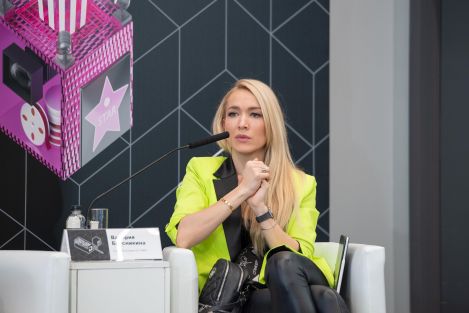
Valeria Brusnikina, manager of the IT projects portfolio of the IPChain Association, answers questions from foreign media
News

03 March 2021
Participants of online discussion "Culture and Creative Industries in Russia," organized by the Confederation of Rightholders' Societies of Europe and Asia (CRSEA), discussed at the edition of the Creative Global Talks the ways to restore creative industries in 2021.
In line with the results presented by the InterMedia Agency, the creative sector in the offline segment shrank by more than 2.5 times in 2020. However, the online sector continued to grow steadily which was conditioned by the specifics of a large-scale isolation that was enforced during the pandemic.
Evgeny Safronov, moderator of the session and editor-in-chief of the InterMedia News Agency, said that the pandemic heavily affected the arts sector and practically put it on hold: “We are not talking about any sort of recovery now, although in the long term the industry is expected to grow comparing to 2020. Possibly, it will reach the level of 2017. Speaking of the governmental support of the cultural sector, Russia is one of the most progressive nations, and it already enabled some cultural institutions to open their doors for visitors.
Maksim Dmitriev, Chairman of the Board of the Russian Copyright Society, said that in 2020 the companies’ revenue increased by an average of 40%. Meanwhile, royalties from gigs and from the use of music in public spaces, cafés, bars and restaurants, decreased by three times.
Eric Valdez-Martinez, Director of the Association of Copyright Holders for the Protection and Management of Copyright in the Sphere of Art (UPRAVIS), outlined reasons that can hamper the growth of the creative sector in 2021: “Russia needs to review the copyright for copies and reproductions. We’re getting requests to use visual artworks. But since it is not possible to find an author, we have to refuse permission to grant rights.”
Irina Vidova-Molchan, singer, author, right holder, acting chair of the Copyright Council of NCIP and member of the Presidium of the CRSEA, has also agreed to do more for better law-making. She believes that it is important to develop clear-cut mechanisms for digital services to pay royalties: “For example, Germany is going to bring a bill that provides a shift of the responsibility for posting content from users to owners of digital services. I hope that this initiative will be approved in Germany in summer, and similar bills will be passed around the globe.”